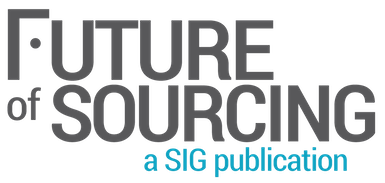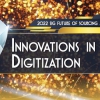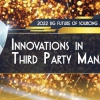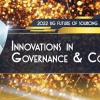Danny Ertel is co-founder and Partner at Vantage Partners, a global consultancy firm that's exerted a fair degree of influence over the evolution of the sourcing space as we know it - not least thanks to the thought leadership of 'Professor Danny'... In October we got together with the Professor at the SIG Summit Fall 2016 in California: if you're looking for a summation of the space in 2016, you could do worse...
Outsource: Danny, we’re here at the SIG Summit with the cream of the sourcing profession, and what constitutes “sourcing” itself could be seen to be constantly evolving and maturing – with “strategic sourcing” now encompassing a multitude of activities including, of course, outsourcing. Can you comment a bit on that evolution? Where are the dotted lines being drawn today?
Danny Ertel: Outsourcing was always a kind of sourcing activity: you still have to define the need, you still have to select the provider, negotiate the contract and manage the relationship. What was different about those contracts was that they were multi-year contracts; they tended to have a pricing model that was dependent upon what the scope was that had been negotiated; they required more involved governance than you have with a typical supplier relationship. But they still are supplier relationships. I think it's a matter of degree, and outsourcing lies towards one end of the spectrum. Because these are big contracts and because they deal with significant functions of the company, some also tend to be classed as strategic relationships. Indeed, for some industries the regulators take a lot of interest in them: in financial services, for example, regulators want to know specifically what you're doing with your outsourcing relationships even more than normal vendor relationships.
O: We first met five or six years ago; what do you think has been the fundamental change in the sourcing space since then? Or has anything really changed fundamentally?
DE: I think contracts have been getting shorter in duration; I think the weight in the deal that has been apportioned to labour arbitrage has been declining a little bit as everybody has a global delivery platform - it isn't just some firms in India and some firms in Europe. There’s also more automation that's taking some of the labour out, so even if you have an advantage in your cost of labour there are fewer bodies in the contract; the economics of the deals are changing. I think the patterns in the deals are changing too: where before the providers lost money for the first 12 to 18 months and then made it up on the back end, when your contract is only three years that can't happen. So a lot of those things are changing: who the players are, what the natures of the contracts are, and how they get managed.
O: Automation has been a big topic here, of course, and there are many different perspectives as to what the long-term significance is for business and for society. Where do you sit on that?
DE: I think it's incremental. I don't think there's going to be this big cliff after which the robots are doing everything - and as we've been hearing it's important to stress that it isn't really robots, it's macros! - but in lots of document processing and transaction processing types of activities, automation makes a lot of sense. Before everyone started calling it robots, they were just calling it efficiency gains which the provider was supposed to be delivering so they could do the work with fewer people. It wasn't all about labour arbitrage anyway; you were also supposed to add scale and with process discipline get the work done with fewer people, and that's what automation is.
O: Well, I guess the social ramifications of that are obvious, aren't they? I suppose we will have to wait and see how it all pans out... Let's look at this Summit specifically: what's really standing out for you in terms of themes or topics of interest?
DE: Well, besides the automation thing, if you scan across the session titles there are a couple of things that are really jumping out. One of these is the focus on stakeholder engagement; there is much more awareness on the part of the sourcing function, or the vendor management function, or however you want to describe it, that you have got to bring your stakeholders along and manage those internal relationships; that there's a whole bunch of things you cannot do to add value in your supplier negotiations and supplier management if you don't have your stakeholders along with you. You can ask for a discount - but as soon as your supplier says "well, I can do better if you make these changes" you need your stakeholders. So stakeholder engagement has become much more important. Then of course there's innovation, which has been a bugaboo of outsourcing and sourcing for 10 or 20 years. More and more people are realising you cannot just contract for innovation, require innovation and govern to it: you need to co-create and collaborate; you need to think about things that you have to change so a supplier can do things differently for you. So I am seeing much more interest in problem-solving approaches rather than to define the spec, and then hold them to the spec.
O: How about the way that Vantage is working with clients: is that changing?
DE: At our size - we're about 75 people - our portfolio of work at any given time is just a snapshot. But it varies; some of the work that we do is very much capability building: training; process design and improvement; playbooks; coaching; job aids. And some of the work that we do is much more transactional: negotiating a deal; fixing a damaged relationship; doing health checks; engaging with the ecosystem. We still are doing both of those. We are seeing more clients coming to us saying "we are in a very difficult relationship with a single-source supplier and we want help developing a strategy for addressing that dynamic"; or "we are in a relationship with a supplier and we have a real problem, and we don't just want to fire them and go to arbitration to come up with a number; we want to figure out a way to make this work." So with organisations who actually want to fix the relationship and work with their supplier, as opposed to just litigating and settling on a payment, there's a lot that we do.
O: How often do you find those to be soluble problems?
DE: Oh, most of the time. If we are hired by the customer in a relationship, in order to be helpful we also have to have some kind of credibility with the supplier - so we have to go to that supplier, introduce ourselves and explain ourselves, and gain enough of their trust that they will participate in the process. Then we can listen to them and find out their concerns so we can try to address those. One of the things I always tell my clients on the buy side is that if you have a troubled relationship the easiest thing you can do is look inside and try to find out how you can become a little bit less expensive to serve - and you can therefore create a little surplus. Now you have a choice: give the surplus to the supplier to make up for some of the hole they've got in that's causing them difficulties; you can try and keep it for yourself; you can split it; or you can invest it into some process improvement and innovation. Whatever your choice, at least now you are dealing from a framework of surplus rather than a framework of scarcity - and it’s easier to start there because it doesn't require the supplier to do anything for you to work out ways that you can become a little bit less expensive to serve.
O: Our colleague Eleanor Winn has said something like that when she was working in advisory, up to 80% of the time when her organisation was brought in to help a customer with what that customer saw as being a problem supplier, the responsibility for the problems was on the customer side…
DE: We get in these little loops: I do something, because I think you’ve done something to me, and you look at what I’ve done and you know you didn’t do anything nearly as dastardly, and so you end up sort of escalating – or rather, spiralling down. If you can stop and get people actually to listen one another and do a bit of joint analysis as to how to define the problem, what are its causes, what are the plausible solutions, you find answers that people were overlooking because they were so ticked off with one another, or because of some injury they remember from the negotiation.
O: Have you found, in your dispute resolution work, that the disputes are becoming more complex or more profound as this space matures? Or is it generally the same old stuff?
DE: People are people... There is more sophistication and a better understanding of contracts and structures, a more mature and competitive market - so a lot of problems have been eliminated through trial and error, some of the old incentive and metric problems are no longer common (though they haven't gone away entirely). But this dynamic, this thing we do, hired by one side but having to work with the other side as well, we do that not only when there is a dispute. We will get calls from clients who say "we really need to take this relationship to the next level; we need to figure out how to work differently with them, how to innovate more, how to develop different types of solutions". I was just talking with somebody here about a very similar thing we did a few years ago in the UK. A financial services client called to say that there was a product the regulators had decided they didn't like very much, and they needed some help working with a provider who was supplying an insurance component of that product, to work out how to create different products that would fill the gap in revenue that they would both be experiencing, but that would work better as far as the regulators were concerned. So there is a process to facilitate a discussion, to work with each side to work out what are they solving for and what's getting in the way, and how can they get there - and in that case we came up with some really interesting solutions.
O: Are you getting asked to work on that kind of thing in the area of digital transformation specifically?
DE: What I think is really critical about digital transformation specifically is how important it is if you're a company going through that transformation, or if you are a supplier whose business it is to help companies through transformation, to think really hard about your ecosystem of partners. Because if you think about the user experience, and about how your users live partly in the digital world and partly in the analogue world, improving the experience across those worlds requires partners. And one of the things that we're going to see more, is companies jumping into digital transformation as it were an IT project, and not really thinking about the ecosystem of companies that are quite different from one another, that have different cultures, different ways of working, different business models, but that are required to come together in order actually to deliver that seamless user experience. And I thought Rohit Kapoor of EXL [one of the SIG Fall 2016 keynotes - ed.] explained quite well that if you botch it, instead of it being a great customer experience, it's a terrible one: there's no gradation. I expect that we are going to do a lot more work that might not be considered sourcing work so much as partner management work, with companies that recognise that in order to transform they need a whole lot of help from a whole lot of players, not just a good provider or two.
O: Do you think that’s something specific to your company – or is that more of a call to arms to the whole sourcing advisory sector?
DE: Well, for us because our work is not just in sourcing advisory - we do a lot of work on all kinds of relationships, whether strategic alliances in life sciences or key account relationships for professional services firms - it is a natural fit, and maybe I'm looking for it because I already see it in parts of my practice. But I do think the whole sourcing advisory community is going to have to think about how we help our clients: not just identifying contracts with the one provider that is going to do this, or the three vendors - one per tower - that everybody is used to in the outsourcing world, but to work across a set of partners, some of which are going to be small and live only on the web, and some are going to be in China and some will be in Denmark - and to make that work across business models and across cultures.





